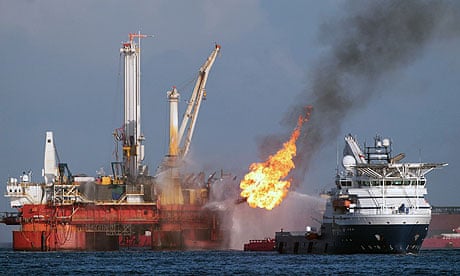Despite BP fighting valiantly to keep reporters and photographers away from the affected areas, the oil is still erupting out of the sea bed, making the waters of the Gulf of Mexico heavy with petroleum and smearing the coastline with black goo.
So what is going to happen now the hurricane season has arrived? The National Oceanographic and Atmospheric Administration claims there won't be any oil droplets in any hurricane's precipitation. But Jeff Masters, the founder of Weather Underground, from the University of Michigan, disagrees. In fact, he claims that the oil droplets in the hurricane-force winds might actually cause "explosive deepening" of hurricanes in the Gulf.
What will happen when an oil-powered hurricane hits New Orleans and splatters its streets and buildings with crude oil? What will happen when it's not just pelicans and turtles that are plastered in black stuff but people? What about when rice and sugarcane are covered in oil? How will BP keep the reporters and photographers out of it then?
But BP is aware of the possibility of impending disaster a hurricane might bring. On the BP oil leak response website, Mike Utsler, the BP incident commander, based in Houma, tells us: "It's an area that we've put tremendous planning and preparation, from everything in terms of how we would respond to moving people, first and foremost, to safety, but how we would also protect and manage the equipment that's so vital to our operations …"
So that's all right then. BP is going to move everybody out of the way of any carcinogenic, petroleum-filled storms that hit the mainland.
But wait a minute! Mike Utsler isn't talking about the people of Louisiana, Mississippi, Alabama and Florida. He's only talking about the people and equipment involved in the cleanup. "How do we do and manage our people," he says "in such a way that their safety is paramount."
In fact, BP apparently has a weather team working in conjunction with "the area command weather experts, as well as of course the hurricane centre, and our NOAA colleagues" so when a hurricane hits New Orleans and plasters the streets and buildings with crude oil, at least BP will have predicted it.
But what it's not predicting, at the moment, is the worst-case scenario.
BP doesn't actually know how big the oil field they drilled into is. They're drilling into lower tertiary (Paleogene) rock that was laid down at the same time mammals and birds were coming into being: 65-23m years ago. It is one of the deepest wells ever drilled by the oil and gas industry, so as you can imagine, they're feeling their way in all this.
Appearing before a House subcommittee in Washington, Tony Hayward, the CEO of BP, estimated that there might be a modest 2bn gallons down there, which could mean it could go on belching out oil for another four years. On the other hand, when BP originally announced their discovery of the "giant" find at its Tiber Prospect, experts estimated the size at 42bn gallons. And since they were talking about "recoverable oil" (which could be only 20% of the actual oil in the site) it would mean the site may hold as much as 210bn gallons. In other words, it could go on belching out oil for another hundred years.
Could that be enough time for the oil slick to reach the Mediterranean? Or, heaven forbid, Brighton?
But we shouldn't blame poor old BP. After all BP didn't know the Deepwater Horizon was going to explode, otherwise there would be 11 oil workers who would still be alive today. And it didn't know (apparently) that it was unsafe to replace the heavy drilling mud in the pipes with lighter seawater, as the rig's chief driller advised them.
And of course once it happened, BP didn't know how to stop the oil coming out.
But then they've got more important things to think about, such as the return to their shareholders. And if the Gulf oil spill goes on for another hundred years, polluting the world's entire ocean system, and the company going into liquidation as a result, that really is something to worry about.
